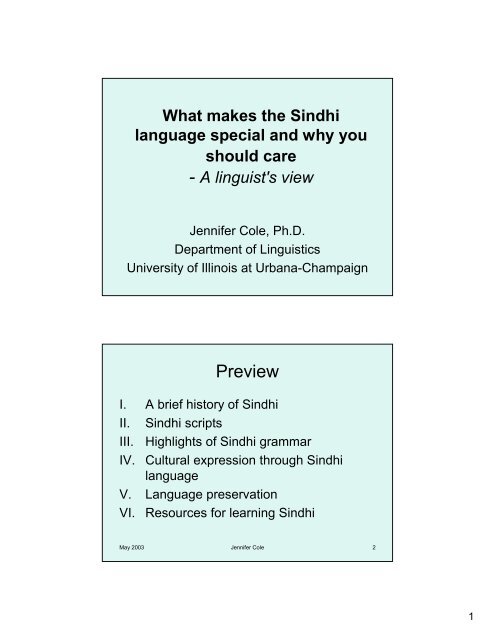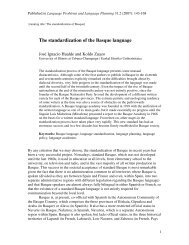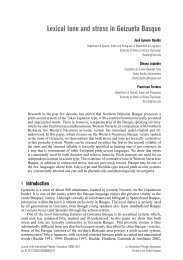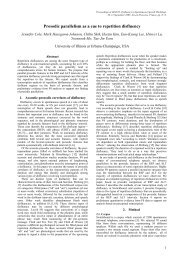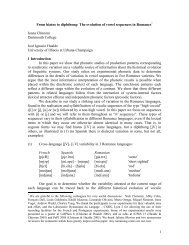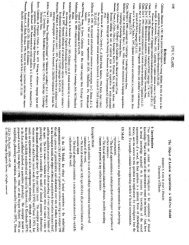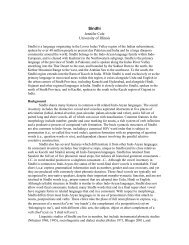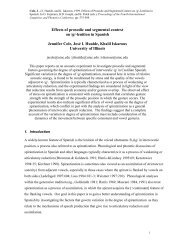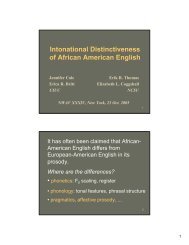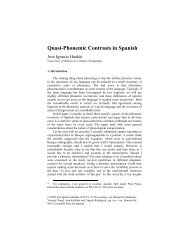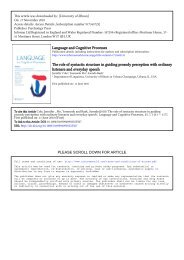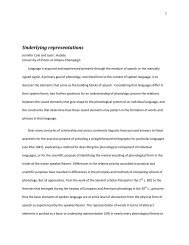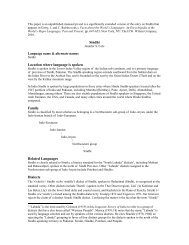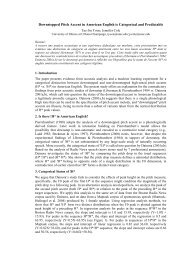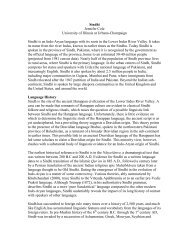What's special about the Sindhi language and why you should care
What's special about the Sindhi language and why you should care
What's special about the Sindhi language and why you should care
Create successful ePaper yourself
Turn your PDF publications into a flip-book with our unique Google optimized e-Paper software.
What makes <strong>the</strong> <strong>Sindhi</strong><br />
<strong>language</strong> <strong>special</strong> <strong>and</strong> <strong>why</strong> <strong>you</strong><br />
<strong>should</strong> <strong>care</strong><br />
- A linguist's view<br />
Jennifer Cole, Ph.D.<br />
Department of Linguistics<br />
University of Illinois at Urbana-Champaign<br />
Preview<br />
I. A brief history of <strong>Sindhi</strong><br />
II.<br />
III.<br />
IV.<br />
<strong>Sindhi</strong> scripts<br />
Highlights of <strong>Sindhi</strong> grammar<br />
Cultural expression through <strong>Sindhi</strong><br />
<strong>language</strong><br />
V. Language preservation<br />
VI.<br />
Resources for learning <strong>Sindhi</strong><br />
May 2003 Jennifer Cole 2<br />
1
I: A brief history of <strong>Sindhi</strong><br />
A brief history of <strong>Sindhi</strong><br />
over two millenia<br />
• <strong>Sindhi</strong> belongs to <strong>the</strong> Indo-Aryan <strong>language</strong><br />
family, along with o<strong>the</strong>r modern Indian<br />
<strong>language</strong>s of <strong>the</strong> north.<br />
– e.g., Hindi, Gujurati, Kashmiri,…<br />
• The earliest written reference to <strong>Sindhi</strong> dates to<br />
<strong>the</strong> 2 nd century A.D./C.E.<br />
• <strong>Sindhi</strong> derives from an ancient Prakrit in use<br />
during <strong>the</strong> early Vedic period, possibly before<br />
<strong>the</strong> emergence of Sanskrit as a st<strong>and</strong>ardized<br />
<strong>language</strong>.<br />
May 2003 Jennifer Cole 4<br />
2
Was <strong>Sindhi</strong> <strong>the</strong> <strong>language</strong> of<br />
Mohen-jo-daro?<br />
• A nice idea, but lacks supporting evidence.<br />
• The Mohen-jo-daro script is not yet<br />
deciphered, <strong>and</strong> not much is known <strong>about</strong><br />
<strong>the</strong> <strong>language</strong> of <strong>the</strong> inhabitants.<br />
• Scholars continue to debate whe<strong>the</strong>r <strong>the</strong><br />
Harappan civilization of Mohen-jo-daro<br />
was Dravidian or Indo-Aryan in origin.<br />
Linguistic evidence is scant.<br />
May 2003 Jennifer Cole 5<br />
Is <strong>Sindhi</strong> related to Persian or Arabic?<br />
• The short answer: Yes (but distantly) <strong>and</strong> No<br />
• Persian is related to <strong>Sindhi</strong>, as both belong to<br />
<strong>the</strong> Indo-European <strong>language</strong> family.<br />
• Arabic is a Semitic <strong>language</strong>, not related to Indo-<br />
European.<br />
• Apparent similarities with Persian <strong>and</strong> Arabic are<br />
due largely to borrowings from those <strong>language</strong>s<br />
into <strong>Sindhi</strong>, <strong>and</strong> are reinforced by <strong>the</strong> use of a<br />
common script (Arabic).<br />
May 2003 Jennifer Cole 6<br />
3
Proto-Indo-European (c. 3,000- 4,000 BCE)<br />
\<br />
Indo-Iranian<br />
/ \<br />
Iranian Indo-Aryan<br />
/ \<br />
(c. 600 BCE)<br />
(c. 1500 BCE)<br />
Dates mark<br />
earliest written<br />
attestations<br />
Old Persian Sanskrit-Prakrit<br />
| |<br />
Mod. Persian Mod. <strong>Sindhi</strong><br />
(c. 200 BCE)<br />
May 2003 Jennifer Cole 7<br />
Proto-Indo-European (c. 3,000- 4,000 BCE)<br />
/ \<br />
(c. 100 CE)<br />
Germanic Indo-Iranian<br />
| / \<br />
| Iranian Indo-Aryan<br />
| / \<br />
Dates mark<br />
earliest written<br />
attestations<br />
(c. 500 CE) (c. 600 BCE) (c. 1500 BCE)<br />
Old English Old Persian Sanskrit-Prakrit<br />
| | |<br />
Mod. English Mod. Persian Mod. <strong>Sindhi</strong><br />
(c. 1500 CE)<br />
(c. 200 BCE)<br />
May 2003 Jennifer Cole 8<br />
4
Is <strong>Sindhi</strong> <strong>the</strong> purest of <strong>the</strong><br />
Indo-Aryan <strong>language</strong>s?<br />
• Linguists would reject this notion– <strong>the</strong>re is no<br />
<strong>language</strong> spoken by humans which resists<br />
change. Not today, not ever.<br />
• <strong>Sindhi</strong> is described as retaining more of <strong>the</strong><br />
features of ancient Prakrit than o<strong>the</strong>r modern<br />
Indic <strong>language</strong>s.<br />
• The conservatism of Sindh could be attributed to<br />
<strong>the</strong> geographic isolation of <strong>the</strong> <strong>Sindhi</strong>-speaking<br />
region. Similarly for Kashmiri, <strong>Sindhi</strong>’s closest<br />
cousin in <strong>the</strong> Indo-Aryan family.<br />
May 2003 Jennifer Cole 9<br />
II. <strong>Sindhi</strong> scripts<br />
5
<strong>Sindhi</strong> scripts: take back <strong>the</strong> write!<br />
• There were four scripts in use at <strong>the</strong> time<br />
of <strong>the</strong> British occupation of Sindh:<br />
Devanagari Gurumukhi<br />
Hatwanki<br />
Perso-Arabic<br />
• The modified Perso-Arabic script, adopted<br />
by British in 1853, is <strong>the</strong> st<strong>and</strong>ard in Sindh.<br />
• The modified Devanagari script is used<br />
today in some <strong>Sindhi</strong> communities in India.<br />
May 2003 Jennifer Cole 11<br />
Which is easier to learn?<br />
• Nei<strong>the</strong>r is very difficult, compared to Chinese…<br />
<strong>and</strong> lots of people learn to read <strong>and</strong> write in<br />
Chinese!<br />
• The modified Devanagari script is easy to learn<br />
for people who already read Hindi.<br />
• The Perso-Arabic script is more complex in that<br />
it has different shapes for <strong>the</strong> letters in initial,<br />
medial, <strong>and</strong> final position of <strong>the</strong> word.<br />
– Somewhat like cursive writing with <strong>the</strong> Roman<br />
alphabet…<br />
May 2003 Jennifer Cole 12<br />
6
Anyone who is literate in<br />
English can become literate in<br />
<strong>Sindhi</strong>.<br />
But it takes practice,<br />
like everything else!<br />
May 2003 Jennifer Cole 13<br />
The little secret of<br />
Romanization for <strong>Sindhi</strong><br />
• <strong>Sindhi</strong> can be written with <strong>the</strong> Roman alphabet we<br />
use for English, <strong>and</strong> it’s easy to learn for someone<br />
literate in English.<br />
“maan sindhii likhaan thii”<br />
• Convenient for computer communication.<br />
• Can be used to facilitate <strong>language</strong> learning at an<br />
elementary level.<br />
• Won’t supplant Perso-Arabic, which is still needed to<br />
access <strong>the</strong> literature <strong>and</strong> print media.<br />
May 2003 Jennifer Cole 14<br />
7
III. Highlights of <strong>Sindhi</strong><br />
Grammar<br />
Notes from a linguist’s journal<br />
Or ---<br />
“How I spent my sabbatical <strong>and</strong><br />
summer vacation”<br />
May 2003 Jennifer Cole 15<br />
The exotic sounds of <strong>Sindhi</strong><br />
Labial Dental Alveolar Retroflex Palatoalveolar<br />
Velar<br />
Stop p b t d k <br />
--plosive<br />
p b t d k <br />
implosive <br />
Affricate<br />
Nasal<br />
c c<br />
j j<br />
m n n <br />
(m) (n) ()<br />
Fricative f s (z) () (x )<br />
Rhotic<br />
r<br />
May 2003 Jennifer Cole 16<br />
()<br />
<br />
8
<strong>Sindhi</strong> consonants not in English<br />
Labial Dental Alveolar Retroflex Palatoalveolar<br />
Velar<br />
Stop p b t d k <br />
--plosive<br />
p b t d k <br />
implosive <br />
Affricate<br />
Nasal<br />
c c<br />
j j<br />
m n n <br />
(m) (n) ()<br />
Fricative f s (z) () (x )<br />
Rhotic<br />
r<br />
May 2003 Jennifer Cole 17<br />
()<br />
<br />
Implosive Consonants<br />
Labial Dental Alveolar Retroflex Palatoalveolar<br />
Velar<br />
Stop p b t d k <br />
--plosive<br />
p b t d k <br />
implosive <br />
Affricate<br />
Nasal<br />
c c<br />
j j<br />
m n n <br />
(m) (n) ()<br />
Fricative f s (z) () (x )<br />
Rhotic<br />
r<br />
May 2003 Jennifer Cole 18<br />
()<br />
<br />
9
Retroflex consonants<br />
Labial Dental Alveolar Retroflex Palatoalveolar<br />
Velar<br />
Stop p b t d k <br />
--plosive<br />
p b t d k <br />
implosive <br />
Affricate<br />
Nasal<br />
c c<br />
j j<br />
m n n <br />
(m) (n) ()<br />
Fricative f s (z) () (x )<br />
Rhotic<br />
r<br />
May 2003 Jennifer Cole 19<br />
()<br />
<br />
Lots of Nasal Consonants<br />
Labial Dental Alveolar Retroflex Palatoalveolar<br />
Velar<br />
Stop p b t d k <br />
--plosive<br />
p b t d k <br />
implosive <br />
Affricate<br />
Nasal<br />
c c<br />
j j<br />
m n n <br />
(m) (n) ()<br />
Fricative f s (z) () (x )<br />
Rhotic<br />
r<br />
May 2003 Jennifer Cole 20<br />
()<br />
<br />
10
Word Order:<br />
Putting <strong>the</strong> cart before <strong>the</strong> horse<br />
• English word order:<br />
Subject -- Verb – Object<br />
Gul speaks <strong>Sindhi</strong>.<br />
• <strong>Sindhi</strong> word order:<br />
Subject – Object – Verb<br />
Gulu <strong>Sindhi</strong>i ggalhaayo-thaa<br />
In <strong>Sindhi</strong> <strong>the</strong> Object comes before <strong>the</strong> Verb.<br />
May 2003 Jennifer Cole 21<br />
Postpositions come later<br />
• In English, <strong>the</strong> preposition precedes <strong>the</strong><br />
noun it modifies:<br />
Leela went inside <strong>the</strong> house<br />
• <strong>Sindhi</strong> uses postpositions, which follow <strong>the</strong><br />
noun:<br />
Leela ghara men vaii<br />
May 2003 Jennifer Cole 22<br />
11
Transforming English to <strong>Sindhi</strong><br />
• Subject stays put<br />
Anil<br />
put<br />
<strong>the</strong> cart<br />
before<br />
<strong>the</strong><br />
horse<br />
Anil<br />
May 2003 Jennifer Cole 23<br />
Transforming English to <strong>Sindhi</strong><br />
• Verb goes to end:<br />
Anil<br />
put<br />
<strong>the</strong> cart<br />
before<br />
<strong>the</strong><br />
horse<br />
Anil<br />
put<br />
May 2003 Jennifer Cole 24<br />
12
Transforming English to <strong>Sindhi</strong><br />
• Object goes before <strong>the</strong> verb<br />
Anil<br />
put<br />
<strong>the</strong> cart<br />
before<br />
<strong>the</strong><br />
horse<br />
Anil<br />
cart<br />
put<br />
May 2003 Jennifer Cole 25<br />
Transforming English to <strong>Sindhi</strong><br />
• Postposition follows <strong>the</strong> noun it modifies,<br />
all preceding <strong>the</strong> object<br />
Anil<br />
put<br />
<strong>the</strong> cart<br />
before<br />
<strong>the</strong><br />
horse<br />
Anil<br />
horse<br />
before<br />
cart<br />
put<br />
Aniila<br />
ghoRe<br />
aggyaan<br />
gaaddo<br />
vidho<br />
May 2003 Jennifer Cole 26<br />
13
Word Order is Free<br />
• Although Subject-Object-Verb is <strong>the</strong> neutral word<br />
order, <strong>the</strong>se parts of <strong>the</strong> sentence can be freely<br />
rearranged:<br />
cokria kuto io<br />
cokria io kuto<br />
kuto cokria io<br />
io cokria kuto<br />
kuto io cokria<br />
io kuto cokria<br />
SOV<br />
SVO<br />
OSV<br />
VSO<br />
OVS<br />
VOS<br />
‘The girl saw <strong>the</strong> dog.’<br />
May 2003 Jennifer Cole 27<br />
Pronouns:<br />
Now <strong>you</strong> see <strong>the</strong>m, now <strong>you</strong> don’t<br />
• In <strong>Sindhi</strong>, Subject pronouns are often<br />
omitted:<br />
(huua) hale-thii.<br />
“(She) leaves.”<br />
• Object pronouns can also be omitted:<br />
huna huu paaRhyo<br />
--- --- paaRhia:i:n<br />
“(He/She) (it) read.”<br />
May 2003 Jennifer Cole 28<br />
14
Pronouns:<br />
Now <strong>you</strong> see <strong>the</strong>m, now <strong>you</strong> don’t<br />
• In <strong>Sindhi</strong>, Subject pronouns are often<br />
omitted:<br />
(huua) hale-thii.<br />
“(She) leaves.”<br />
• Object pronouns can also be omitted:<br />
huna huu paaRhyo<br />
--- ---<br />
“(He/She) (it) read.”<br />
paaRhia:i:n<br />
Do <strong>you</strong> notice<br />
<strong>the</strong> difference<br />
In <strong>the</strong> verb<br />
endings?<br />
May 2003 Jennifer Cole 29<br />
Getting tense: <strong>Sindhi</strong> verbs<br />
• There are many ways to conjugate a verb<br />
in <strong>Sindhi</strong>, depending on<br />
– It’s use as a verb, adjective or adverb;<br />
– The tense, aspect, mood;<br />
– The number <strong>and</strong> gender of <strong>the</strong> noun it agrees<br />
with.<br />
• Ignoring number/gender, <strong>the</strong>re are 23<br />
distinct verb forms for each verb.<br />
– Verb<br />
– Verb + Auxiliary<br />
May 2003 Jennifer Cole 30<br />
15
Verbs as adjectives <strong>and</strong> adverbs<br />
halau<br />
halaio<br />
hal<strong>and</strong>o<br />
halyalu, halyo<br />
hal<strong>and</strong>e<br />
hali, hali kare<br />
`to go’<br />
`<strong>about</strong> to taken’<br />
`going’<br />
`went’<br />
`(as he was) going’<br />
`(as he) went’<br />
May 2003 Jennifer Cole 31<br />
Finite Verbs (many of <strong>the</strong>m)<br />
hale `if he goes’ halyo `he went’<br />
hale to `he goes’ halyo ahe `he has gone’<br />
hale ha `had he gone’ halyo huyo `he had gone’<br />
hal<strong>and</strong>o `he will go’ halyo hundo `he must have gone’<br />
hal<strong>and</strong>o ahe `he goes’ halyo huje `he may have gone’<br />
hal<strong>and</strong>o huyo `he used to go’ halyo <strong>the</strong> `he would go’<br />
hal<strong>and</strong>o hundo<br />
hal<strong>and</strong>o huje<br />
hali rahyo ahe<br />
`he is probably<br />
going’<br />
`(perhaps) he<br />
goes’<br />
`he is going’<br />
halu<br />
halo, halije<br />
`Go!’ (rude)<br />
`Go!’ (polite)<br />
hali rahyo huyo<br />
`he was going’<br />
May 2003 Jennifer Cole 32<br />
16
Agree to disagree with verbs<br />
• In many <strong>language</strong>s, including English, <strong>the</strong> verb<br />
agrees with <strong>the</strong> subject.<br />
• In <strong>Sindhi</strong>, <strong>the</strong> verb agrees with <strong>the</strong> subject most<br />
of <strong>the</strong> time, but in some sentences <strong>the</strong> verb<br />
agrees with <strong>the</strong> object.<br />
– Past tense of transitive verbs:<br />
cokria kuto io<br />
Girl-fem dog-masc. saw-masc.<br />
‘The girl saw <strong>the</strong> dog.’<br />
May 2003 Jennifer Cole 33<br />
IV. Cultural expression<br />
through <strong>Sindhi</strong> <strong>language</strong><br />
17
• The <strong>Sindhi</strong> perspective can often be<br />
gleaned through <strong>the</strong> <strong>language</strong><br />
constructions that are used.<br />
• Translating <strong>the</strong> mindset is often harder<br />
than translating <strong>the</strong> actual words <strong>and</strong><br />
phrases. (True for any <strong>language</strong>)<br />
• Following are a few personal observations.<br />
May 2003 Jennifer Cole 35<br />
Don’t confront<br />
• <strong>Sindhi</strong>s often prefer indirect expressions to<br />
communicate advice or an injunction to<br />
action.<br />
• <strong>Sindhi</strong>i sikhije<br />
Lit: <strong>Sindhi</strong> <strong>should</strong> be learned.<br />
“You <strong>should</strong> learn <strong>Sindhi</strong>.” (wistful?)<br />
Close to but not quite <strong>the</strong> same as <strong>the</strong> American<br />
English generic: “One <strong>should</strong> learn <strong>Sindhi</strong>.”<br />
May 2003 Jennifer Cole 36<br />
18
Don’t disappoint<br />
• “Can <strong>you</strong> do this?”<br />
– haa, thii tho saghe<br />
Lit: yes, it’s possible<br />
“It may not be possible.”<br />
[colloquial American English: “Don’t count on it.”]<br />
• “Will <strong>you</strong> come tomorrow?”<br />
– ji<strong>the</strong> daaNo paaNii huundo...<br />
Lit: where grain <strong>and</strong> water will be<br />
“If fate ordains…”<br />
A polite way to say “not sure, maybe not”<br />
May 2003 Jennifer Cole 37<br />
Assume <strong>the</strong> worst<br />
• chaai kaana aahe.<br />
(Said with question intonation)<br />
Lit: There is not any tea?<br />
“Is <strong>the</strong>re any tea?”<br />
May 2003 Jennifer Cole 38<br />
19
V. Language preservation<br />
Will <strong>Sindhi</strong> survive into <strong>the</strong> next<br />
century?<br />
• Estimated 40 million <strong>Sindhi</strong> speakers in Pakistan<br />
(1991 census- cancelled before completion)<br />
• Estimated 1.2 million <strong>Sindhi</strong> speakers in India<br />
(1971 census; including Kachchi would bring<br />
total to 1.7 million).<br />
• Even inflating figures for population growth,<br />
<strong>Sindhi</strong> is a “small” <strong>language</strong>. But is it<br />
threatened? Is it actually endangered?<br />
May 2003 Jennifer Cole 40<br />
20
Some background facts<br />
• There are an estimated 6,000 (+/- 1K)<br />
<strong>language</strong>s spoken in <strong>the</strong> world today.<br />
• Distribution<br />
– Europe 4%<br />
– Americas 15%<br />
– Africa 31%<br />
– Asia 50% (Papua New Guinea<br />
& Pacific Isl<strong>and</strong>s + Indonesia: 25% !)<br />
May 2003 Jennifer Cole 41<br />
A few <strong>language</strong>s dominate <strong>the</strong><br />
world scene<br />
• 10 major <strong>language</strong>s, each spoken by over 109<br />
million people, are <strong>the</strong> mo<strong>the</strong>r tongues of almost<br />
half (49%) of <strong>the</strong> world's population.<br />
• 4% of <strong>language</strong>s spoken today are spoken by<br />
96% of <strong>the</strong> world’s population.<br />
• Top 8: M<strong>and</strong>arin, Spanish, English, Bengali,<br />
Hindi, Portuguese, Russian, Japanese.<br />
May 2003 Jennifer Cole 42<br />
21
How fast can a <strong>language</strong> become<br />
endangered?<br />
Some factors determining rate of decline:<br />
• Use of <strong>the</strong> <strong>language</strong> in <strong>the</strong> home.<br />
• Number of speakers in lower age groups.<br />
• Pattern of <strong>language</strong> loss as speakers<br />
leave home environment.<br />
• Pattern of <strong>language</strong> use by women of<br />
childbearing age.<br />
May 2003 Jennifer Cole 43<br />
Linguists’ best estimate<br />
• 50% of today’s <strong>language</strong>s are moribund,<br />
are not being transmitted to children.<br />
• These <strong>language</strong>s are expected to be<br />
lost in <strong>the</strong> next 100 years.<br />
– 3,000 <strong>language</strong>s lost in 1,200 months<br />
– Approx. 1 <strong>language</strong> lost every 2 weeks.<br />
May 2003 Jennifer Cole 44<br />
22
The fewer <strong>the</strong> better?<br />
• Maybe a reduction in numbers of<br />
<strong>language</strong>s will ease communication, help<br />
to build nations <strong>and</strong> global solidarity.<br />
• If everyone had equal access to <strong>the</strong><br />
<strong>language</strong> of power, would that level <strong>the</strong><br />
playing field in <strong>the</strong> development of<br />
societies?<br />
May 2003 Jennifer Cole 45<br />
Or…Strength in numbers?<br />
• But… arguably, <strong>the</strong> success of humanity is due<br />
to <strong>the</strong> ability to develop cultures suited for<br />
survival in a variety of environments.<br />
• These cultures have everywhere been<br />
transmitted by <strong>language</strong>s, in oral traditions <strong>and</strong><br />
in written literatures.<br />
• Each <strong>language</strong> constitutes a model of <strong>the</strong><br />
universe, a way of underst<strong>and</strong>ing <strong>the</strong> world.<br />
May 2003 Jennifer Cole 46<br />
23
Four reasons <strong>why</strong> small<br />
<strong>language</strong>s <strong>should</strong> be<br />
preserved<br />
1. Language expresses identity<br />
– When a <strong>language</strong> is lost, so also is <strong>the</strong><br />
unique identity of <strong>the</strong> community.<br />
“Every <strong>language</strong> is a temple in which <strong>the</strong><br />
soul of those who speak is enshrined.”<br />
--- Oliver Wendall Holmes<br />
May 2003 Jennifer Cole 48<br />
24
2. “Languages are <strong>the</strong> archives of history.”<br />
--- Ralph Waldo Emerson<br />
– Language links us to our parents, our<br />
gr<strong>and</strong>parents, <strong>and</strong> to <strong>the</strong>ir ancestors.<br />
3. Knowledge is preserved through<br />
<strong>language</strong>.<br />
4. Multilingualism is enriching!<br />
– It’s <strong>the</strong> norm in most of <strong>the</strong> world outside of<br />
North America.<br />
May 2003 Jennifer Cole 49<br />
VI. Resources for Learning<br />
<strong>Sindhi</strong><br />
25
Learning <strong>Sindhi</strong><br />
• Print resources:<br />
– K. Lekhwani (1987) An Intensive Course in<br />
<strong>Sindhi</strong>. Published by <strong>the</strong> Central Institute of<br />
Indian Languages, Mysore (India)<br />
– H. Addleton <strong>and</strong> P. Brown (1981) Functional<br />
<strong>Sindhi</strong>. Unpublished manuscript.<br />
Contact me<br />
<strong>about</strong> xerox<br />
copies<br />
May 2003 Jennifer Cole 51<br />
Learning <strong>Sindhi</strong><br />
• Computer resources:<br />
– Let’s Learn <strong>Sindhi</strong> (2002). Published by<br />
<strong>Sindhi</strong> Sangat <strong>and</strong> <strong>the</strong> Indian Institute of<br />
Sindhology (India). Available on CD.<br />
– Let’s Talk <strong>Sindhi</strong><br />
May 2003 Jennifer Cole 52<br />
26
To appear…<br />
• <strong>Sindhi</strong> Online, a self-directed online<br />
course in <strong>Sindhi</strong> I’m developing at <strong>the</strong><br />
University of Illinois.<br />
– Based on <strong>the</strong> summer Intensive <strong>Sindhi</strong> course<br />
taught at <strong>the</strong> University of Illinois at Urbana-<br />
Champaign in 2000.<br />
– Geared towards an English-speaking adult<br />
learner.<br />
May 2003 Jennifer Cole 53<br />
27


